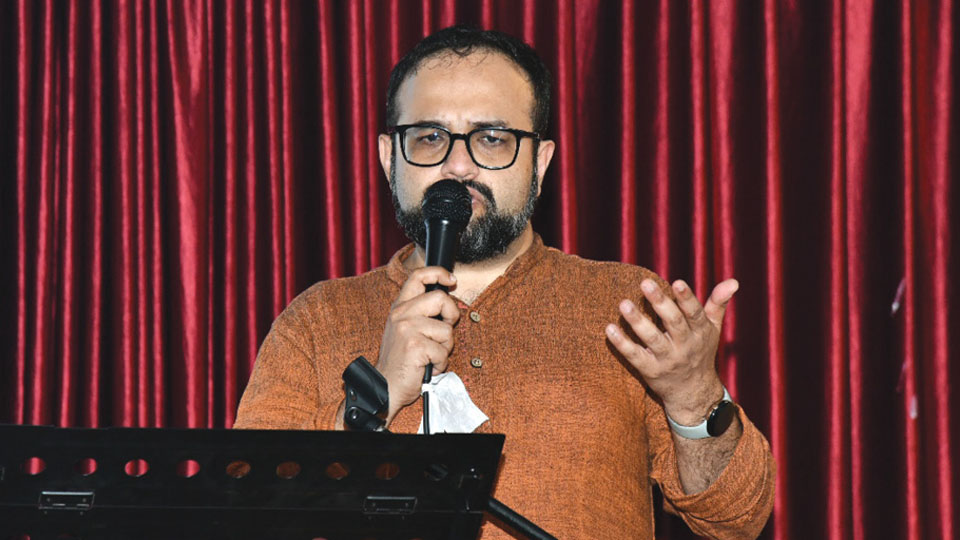Alok Prasanna Kumar of Vidhi Centre for Legal Policy warns of expanding regulations
Mysuru: Alok Prasanna Kumar from the Vidhi Centre for Legal Policy, Bengaluru, delivered a talk titled ‘An Ice Age for Free Speech’ at a programme organised by the Mysore Open Forum (MOF) at Kalpa Kshetra Auditorium in Vijayanagar Fourth Stage yesterday.
Highlighting the Government’s 1995 introduction of The Cable Television Networks (Regulation) Act to regulate cable TV operations, Alok Prasanna Kumar stated that the Ministry of Information and Broadcasting has now drafted the Broadcasting Services (Regulation) Bill, 2024, which aims to replace the 1995 Act.
This new Bill classifies influencers and social media accounts that discuss current affairs or news online as ‘digital news broadcasters.’
He further explained that the Bill introduces the term ‘digital news broadcasters,’ covering individuals and entities producing online news or current affairs content, such as newsletters, social media posts, podcasts, and videos.
It also raises concerns about non-traditional media creators being subjected to regulations similar to those imposed on streaming platforms, he added.
Prasanna Kumar continued by stating that the Bill extends its scope beyond Over-The-Top (OTT) content and digital news to include social media accounts and online video creators, building upon a version of the draft law released in November 2023.
OTT content and digital news
The updated version broadly defines ‘digital news broadcasters,’ requiring prior registration with the Government and establishing content evaluation standards. This Bill revises the 2023 draft by the Ministry of Information and Broadcasting, aiming to consolidate the legal framework for the broadcasting sector while extending it to OTT content and digital news.
“The Bill redefines ‘programme’ and ‘broadcasting’ to encompass textual content, ensuring coverage of all online news-related material. For example, a Chartered Accountant offering financial advice on YouTube or a journalist sharing updates on Twitter could now fall under this regulatory framework,” he explained. These updates aim to ensure the legislation keeps pace with the rapidly evolving digital media landscape.
He further elaborated, “If a creator is classified as a digital news broadcaster, they must notify the Ministry of Information and Broadcasting about their content. They are also required to establish Content Evaluation Committees (CEC) at their own expense, ensuring diverse representation, including individuals knowledgeable about social groups, women’s issues, child welfare, Scheduled Castes, Scheduled Tribes, and Minorities.” He added that the names of CEC members must be submitted to the Government.
In addition, Prasanna Kumar discussed the state of India’s media, anti-free speech injunctions, the control of social media, and the use of SLAPP (Strategic Lawsuits Against Public Participation), also known as intimidation lawsuits or strategic litigations aimed at silencing public participation. MOF office-bearers and other attendees were present.








Recent Comments